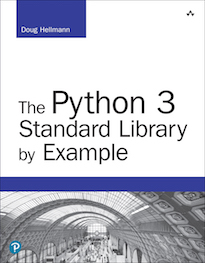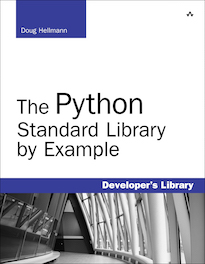Interpreter Settings¶
sys contains attributes and functions for accessing compile-time or runtime configuration settings for the interpreter.
Build-time Version Information¶
The version used to build the C interpreter is available in a few forms. sys.version is a human-readable string that usually includes the full version number as well as information about the build date, compiler, and platform. sys.hexversion is easier to use for checking the interpreter version since it is a simple integer. When formatted using hex(), it is clear that parts of sys.hexversion come from the version information also visible in the more readable sys.version_info (a 5-part tuple representing just the version number).
More specific information about the source that went into the build can be found in the sys.subversion tuple, which includes the actual branch and subversion revision that was checked out and built. The separate C API version used by the current interpreter is saved in sys.api_version.
import sys
print 'Version info:'
print
print 'sys.version =', repr(sys.version)
print 'sys.version_info =', sys.version_info
print 'sys.hexversion =', hex(sys.hexversion)
print 'sys.subversion =', sys.subversion
print 'sys.api_version =', sys.api_version
All of the values depend on the actual interpreter used to run the sample program, of course.
$ python2.6 sys_version_values.py
Version info:
sys.version = '2.6.8 (unknown, Aug 31 2012, 07:19:38) \n[GCC 4.2.
1 (Based on Apple Inc. build 5658) (LLVM build 2336.1.00)]'
sys.version_info = (2, 6, 8, 'final', 0)
sys.hexversion = 0x20608f0
sys.subversion = ('CPython', '', '')
sys.api_version = 1013
$ python2.7 sys_version_values.py
Version info:
sys.version = '2.7.2 (v2.7.2:8527427914a2, Jun 11 2011, 15:22:34)
\n[GCC 4.2.1 (Apple Inc. build 5666) (dot 3)]'
sys.version_info = sys.version_info(major=2, minor=7, micro=2, release
level='final', serial=0)
sys.hexversion = 0x20702f0
sys.subversion = ('CPython', '', '')
sys.api_version = 1013
The operating system platform used to build the interpreter is saved as sys.platform.
import sys
print 'This interpreter was built for:', sys.platform
For most Unix systems, the value comes from combining the output of uname -s with the first part of the version in uname -r. For other operating systems there is a hard-coded table of values.
$ python sys_platform.py
This interpreter was built for: darwin
Install Location¶
The path to the actual interpreter program is available in sys.executable on all systems for which having a path to the interpreter makes sense. This can be useful for ensuring that the correct interpreter is being used, and also gives clues about paths that might be set based on the interpreter location.
sys.prefix refers to the parent directory of the interpreter installation. It usually includes bin and lib directories for executables and installed modules, respectively.
import sys
print 'Interpreter executable:', sys.executable
print 'Installation prefix :', sys.prefix
Note
This example output was produced on a Mac running a framework build installed from python.org. Other versions may produce different path information, even on a Mac.
$ python sys_locations.py
Interpreter executable: /Users/dhellmann/Envs/pymotw/bin/python
Installation prefix : /Users/dhellmann/Envs/pymotw/bin/..
Command Line Options¶
The CPython interpreter accepts several command line options to control its behavior.
$ python -h
usage: python [option] ... [-c cmd | -m mod | file | -] [arg] ...
Options and arguments (and corresponding environment variables):
-B : don't write .py[co] files on import; also PYTHONDONTWRITEBYTECODE=x
-c cmd : program passed in as string (terminates option list)
-d : debug output from parser; also PYTHONDEBUG=x
-E : ignore PYTHON* environment variables (such as PYTHONPATH)
-h : print this help message and exit (also --help)
-i : inspect interactively after running script; forces a prompt even
if stdin does not appear to be a terminal; also PYTHONINSPECT=x
-m mod : run library module as a script (terminates option list)
-O : optimize generated bytecode slightly; also PYTHONOPTIMIZE=x
-OO : remove doc-strings in addition to the -O optimizations
-Q arg : division options: -Qold (default), -Qwarn, -Qwarnall, -Qnew
-s : don't add user site directory to sys.path; also PYTHONNOUSERSITE
-S : don't imply 'import site' on initialization
-t : issue warnings about inconsistent tab usage (-tt: issue errors)
-u : unbuffered binary stdout and stderr; also PYTHONUNBUFFERED=x
see man page for details on internal buffering relating to '-u'
-v : verbose (trace import statements); also PYTHONVERBOSE=x
can be supplied multiple times to increase verbosity
-V : print the Python version number and exit (also --version)
-W arg : warning control; arg is action:message:category:module:lineno
also PYTHONWARNINGS=arg
-x : skip first line of source, allowing use of non-Unix forms of #!cmd
-3 : warn about Python 3.x incompatibilities that 2to3 cannot trivially fix
file : program read from script file
- : program read from stdin (default; interactive mode if a tty)
arg ...: arguments passed to program in sys.argv[1:]
Other environment variables:
PYTHONSTARTUP: file executed on interactive startup (no default)
PYTHONPATH : ':'-separated list of directories prefixed to the
default module search path. The result is sys.path.
PYTHONHOME : alternate <prefix> directory (or <prefix>:<exec_prefix>).
The default module search path uses <prefix>/pythonX.X.
PYTHONCASEOK : ignore case in 'import' statements (Windows).
PYTHONIOENCODING: Encoding[:errors] used for stdin/stdout/stderr.
Some of these are available for programs to check through sys.flags.
import sys
if sys.flags.debug:
print 'Debuging'
if sys.flags.py3k_warning:
print 'Warning about Python 3.x incompatibilities'
if sys.flags.division_warning:
print 'Warning about division change'
if sys.flags.division_new:
print 'New division behavior enabled'
if sys.flags.inspect:
print 'Will enter interactive mode after running'
if sys.flags.optimize:
print 'Optimizing byte-code'
if sys.flags.dont_write_bytecode:
print 'Not writing byte-code files'
if sys.flags.no_site:
print 'Not importing "site"'
if sys.flags.ignore_environment:
print 'Ignoring environment'
if sys.flags.tabcheck:
print 'Checking for mixed tabs and spaces'
if sys.flags.verbose:
print 'Verbose mode'
if sys.flags.unicode:
print 'Unicode'
Experiment with sys_flags.py to learn how the command line options map to the flags settings.
$ python -3 -S -E sys_flags.py
Warning about Python 3.x incompatibilities
Warning about division change
Not importing "site"
Ignoring environment
Checking for mixed tabs and spaces
Unicode Defaults¶
To get the name of the default Unicode encoding being used by the interpreter, use getdefaultencoding(). The value is set during startup by site, which calls sys.setdefaultencoding() and then removes it from the namespace in sys to avoid having it called again.
The internal encoding default and the filesystem encoding may be different for some operating systems, so there is a separate way to retrieve the filesystem setting. getfilesystemencoding() returns an OS-specific (not filesystem-specific) value.
import sys
print 'Default encoding :', sys.getdefaultencoding()
print 'Filesystem encoding :', sys.getfilesystemencoding()
Rather than changing the global default encoding, most Unicode experts recommend making an application explicitly Unicode-aware. This provides two benefits: Different Unicode encodings for different data sources can be handled more cleanly, and the number of assumptions about encodings in the application code is reduced.
$ python sys_unicode.py
Default encoding : ascii
Filesystem encoding : utf-8
Interactive Prompts¶
The interactive interpreter uses two separate prompts for indicating the default input level (ps1) and the “continuation” of a multi-line statement (ps2). The values are only used by the interactive interpreter.
>>> import sys
>>> sys.ps1
'>>> '
>>> sys.ps2
'... '
>>>
Either or both prompt can be changed to a different string
>>> sys.ps1 = '::: '
::: sys.ps2 = '~~~ '
::: for i in range(3):
~~~ print i
~~~
0
1
2
:::
Alternately, any object that can be converted to a string (via __str__) can be used for the prompt.
import sys
class LineCounter(object):
def __init__(self):
self.count = 0
def __str__(self):
self.count += 1
return '(%3d)> ' % self.count
The LineCounter keeps track of how many times it has been used, so the number in the prompt increases each time.
$ python
Python 2.6.2 (r262:71600, Apr 16 2009, 09:17:39)
[GCC 4.0.1 (Apple Computer, Inc. build 5250)] on darwin
Type "help", "copyright", "credits" or "license" for more information.
>>> from PyMOTW.sys.sys_ps1 import LineCounter
>>> import sys
>>> sys.ps1 = LineCounter()
( 1)>
( 2)>
( 3)>
Display Hook¶
sys.displayhook is invoked by the interactive interpreter each time the user enters an expression. The result of the expression is passed as the only argument to the function.
import sys
class ExpressionCounter(object):
def __init__(self):
self.count = 0
self.previous_value = self
def __call__(self, value):
print
print ' Previous:', self.previous_value
print ' New :', value
print
if value != self.previous_value:
self.count += 1
sys.ps1 = '(%3d)> ' % self.count
self.previous_value = value
sys.__displayhook__(value)
print 'installing'
sys.displayhook = ExpressionCounter()
The default value (saved in sys.__displayhook__) prints the result to stdout and saves it in __builtin__._ for easy reference later.
$ python
Python 2.6.2 (r262:71600, Apr 16 2009, 09:17:39)
[GCC 4.0.1 (Apple Computer, Inc. build 5250)] on darwin
Type "help", "copyright", "credits" or "license" for more information.
>>> import PyMOTW.sys.sys_displayhook
installing
>>> 1+2
Previous: <PyMOTW.sys.sys_displayhook.ExpressionCounter object at 0x9c5f90>
New : 3
3
( 1)> 'abc'
Previous: 3
New : abc
'abc'
( 2)> 'abc'
Previous: abc
New : abc
'abc'
( 2)> 'abc' * 3
Previous: abc
New : abcabcabc
'abcabcabc'
( 3)>

